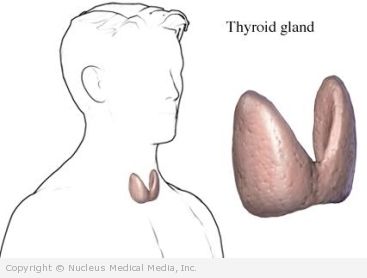Hypothyroidism
(Hashimoto’s Thyroiditis; Underactive Thyroid)
Hypothyroidism – Definition
Hypothyroidism happens when the thyroid gland does not produce enough thyroid hormone. The thyroid gland is a butterfly-shaped gland in the front of the neck. It produces hormones that control metabolism. The most common form is Hashimoto’s thyroiditis.
Hypothyroidism – Causes
Hashimoto’s thyroiditis occurs when the immune system produces antibodies that attack cells of the thyroid gland. This causes chronic thyroid swelling and loss of function. Other causes include:
- Idiopathic thyroid atrophy — destruction of thyroid tissue for unknown reasons
- Iodine deficiency — when a thyroid gland needs iodine to produce thyroid hormone (rare in the United States)
- Subacute thyroiditis — following a viral upper respiratory tract infection
- Medical treatments — radiation to the head and neck or surgical removal of the thyroid gland (called subtotal thyroidectomy)
- Medicines (eg, lithium, iodine, alpha-interferons, thiourea, amiodarone, interleukins)
- Certain diseases (eg, cancer or infection)
- Pituitary adenoma — benign tumor of the pituitary gland
Hypothyroidism – Risk Factors
These factors increase your chance of developing hypothyroidism:
Risk factors include:
- Age: risk increases with age, especially over 65 years old
- Sex: more common in females
- Genetics: multiglandular autoimmune syndrome
- Ethnicity: Caucasian, Hispanic
- History of family members with hypothyroidism
- History of other autoimmune diseases:
- Pernicious anemia
- Type 1 diabetes
- Underactive adrenal or parathyroid glands
- Rheumatoid arthritis
- Lupus
Tell your doctor if you have any of these risk factors.
Hypothyroidism – Symptoms
Years may pass before you notice symptoms.
Symptoms include:
- Fatigue
- Weakness
- Coarse, brittle hair; hair loss
- Facial puffiness
- Dry skin
- Swollen hands or feet
- Cold intolerance
- Weight gain
- Constipation
- Achy feeling all over
- Depression and irritability
- Memory loss
- Difficulty with concentration
- Blurred vision
- Menstrual abnormalities or infertility
Symptoms of severe or prolonged cases include:
- Stupor or coma
- Slow heart rate
- Depressed breathing
- Hypothermia (low body temperature)
- Hoarseness
Hypothyroidism – Diagnosis
The doctor will ask about your symptoms and medical and family history, and perform a physical exam. To confirm the diagnosis, blood tests will be done, which include:
- Thyroid stimulating hormone (TSH)
- Free T4 and total T3
- Antibodies that attack the thyroid gland
Hypothyroidism – Treatment
In the early stages of Hashimoto’s thyroiditis, there is no specific treatment. But, in most cases, you will end up developing hypothyroidism. Treatment includes:
- Medicine to replace the thyroid hormones (eg, levothyroxine, triiodothyronine)
- High-fiber diet to reduce constipation
- Low-fat, low-calorie diet if you are overweight or obese
Hypothyroidism – Prevention
To help reduce your chance of getting hypothyroidism, take the following steps:
- Get a screening test every five years if you are 50 years old or older.
- Get regular screenings if you:
- Have Type 1 diabetes
- Have infertility (females)
- Take certain medicines

